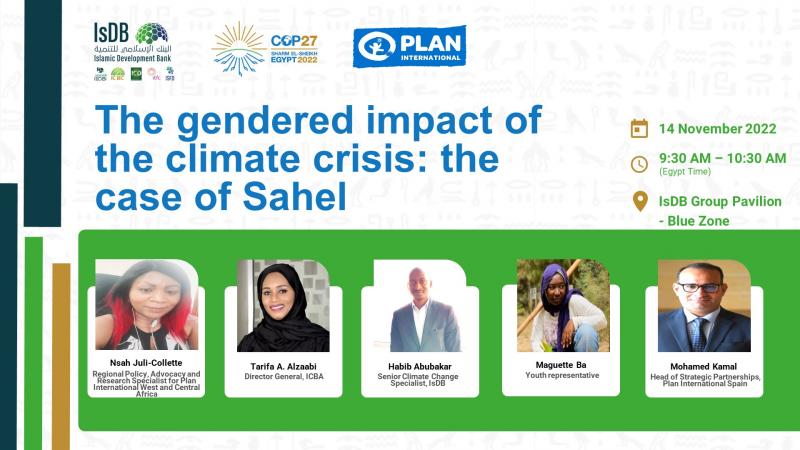
The gendered impact of the climate crisis: the case of Sahel
Time & Date of Event
9:30 AM to 10:30 AM on Monday, 14th of November 2022
Event Overview
The climate crisis is the greatest injustice of our generation. Preexisting discriminatory gender and social norms mean that girls and women are disproportionately affected by climate change and have the fewest resources to cope.
While they are the most impacted by climate change, the voice of women and girls is often left unheard. According to a report from Plan International, 80% of young people want to participate in climate policy-making processes, such as COPs, but less than 10% have been able to do so1.Youth-led participation, in climate policy processes, especially of girls and young women, is therefore central and has to be ensured.
Countries of West and Central Africa, especially in the Sahel region, are particularly affected by climate change with the persistence of extreme weather conditions, such a prolonged drought episodes, lower fertility of soils, shortages in resources and water, and skyrocketing levels of acute food insecurity. Women and girls’ everyday lives in the Sahel are marked by growing inequality, hunger, lack of access to education and health services, threats to livelihoods, risks of gender-based violence, child, early and forced marriage.
Plan International is present in the Sahel responding to the specific needs of women and girls, and is currently leading a study on the differentiated impact of climate change on girls and young women in the region, identifying policy gaps and shaping recommendations for a gender transformative approach to address climate change in the region.
The panel aims at putting together policy specialists, donors and private companies active in the Sahel region, working in climate/energy sector with a gender focus.
Event Outcomes
By shedding the light on the gendered impacts of climate change in the Sahel region, the panel session aims at supporting policy asks of civil society towards the COP27 parties to take concrete steps to include women and girls in climate action, policy processes and programmes. In particular it is essential that the loss and damages mechanism adopts a youth participation approach including the perspectives of girls and young women.